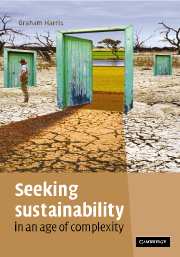Book contents
- Frontmatter
- Contents
- Acknowledgements
- 1 Preamble: the world we are in
- 2 Complexity and complex systems
- 3 New science, new tools, new challenges
- 4 The complexity of ecology
- 5 The generation of complexity
- 6 Micro-interactions and macro-constraints
- 7 A sense of place
- 8 Created landscapes and our changing sense of place
- 9 Catchment form and function
- 10 Catchment loads: ecosystem impacts
- 11 Change detection, monitoring and prediction
- 12 Evidence, uncertainty and risk
- 13 Modified landscapes: biodiversity
- 14 Function in fragmented landscapes
- 15 Environmental flows
- 16 Evidence for global change
- 17 Values and beliefs
- 18 Managing environmental, social and economic systems
- 19 Linking multiple capitals in a changing world
- 20 Community, capacity, collaboration and innovation
- 21 A new environmental paradigm
- 22 Emergent problems and emerging solutions: developing an ‘ecolophysics’?
- 23 Avoiding collapse
- Index
18 - Managing environmental, social and economic systems
Published online by Cambridge University Press: 21 March 2011
- Frontmatter
- Contents
- Acknowledgements
- 1 Preamble: the world we are in
- 2 Complexity and complex systems
- 3 New science, new tools, new challenges
- 4 The complexity of ecology
- 5 The generation of complexity
- 6 Micro-interactions and macro-constraints
- 7 A sense of place
- 8 Created landscapes and our changing sense of place
- 9 Catchment form and function
- 10 Catchment loads: ecosystem impacts
- 11 Change detection, monitoring and prediction
- 12 Evidence, uncertainty and risk
- 13 Modified landscapes: biodiversity
- 14 Function in fragmented landscapes
- 15 Environmental flows
- 16 Evidence for global change
- 17 Values and beliefs
- 18 Managing environmental, social and economic systems
- 19 Linking multiple capitals in a changing world
- 20 Community, capacity, collaboration and innovation
- 21 A new environmental paradigm
- 22 Emergent problems and emerging solutions: developing an ‘ecolophysics’?
- 23 Avoiding collapse
- Index
Summary
The complex problem of managing the coupled ‘system of systems’: how it is also hedged about by values and assumptions about the way the world works. Some heterodox views of a more inclusive set of tools.
Many can perceive that this world of ours is becoming more and more complicated and fragile as a result of a host of linkages between technological, environmental, political, social and economic forces. The hurricanes that hit the southern USA in 2005 clearly indicated that many of our socioeconomic systems do not collapse gracefully. The problems of global sustainability and natural resource management are indeed ‘wicked’ problems where we are trying to deal with meso-scale interactive landscapes, emergent properties of the micro-scale agent behaviour and macro-scale constraints. Achieving solutions to many of these challenges will require us to think not just about single prescriptions but about the complexity of ‘systems of systems’, their properties and responses, and how the action and interaction of local components across and between scales can emerge as global outcomes. If we seek a more sustainable future then we are desperately in need of more, and better, tools for integrated assessments and prediction – or if not prediction, then at least monitoring and adaptive management. Environmental impact assessments need to be placed in an adaptive management framework: a framework characterised by less methodological, institutional and organisational rigidity.
- Type
- Chapter
- Information
- Seeking Sustainability in an Age of Complexity , pp. 245 - 263Publisher: Cambridge University PressPrint publication year: 2007



